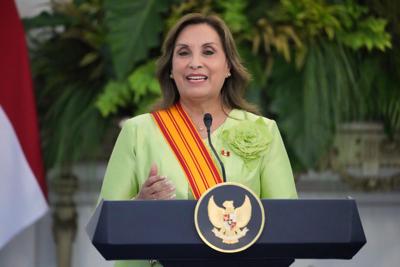LIMA, Peru (AP) — Peru's president on Wednesday signed an amnesty bill into law, preventing military personnel and police officers from being prosecuted over alleged human rights abuses during the country’s armed conflict decades ago.
The new law came despite calls from the local and international community to strike it down. The war that raged between the Peruvian military and the Shining Path communist insurgency from 1980 to 2000 left an estimated 70,000 people dead, the majority of them in rural areas.
President Dina Boluarte said during an official ceremony that Peru “honors” those people who confronted the insurgency with “courage and dedication." She added that military members and police officers have carried “for years the burden of endless trials, unjust accusations, and a pain that has affected not only them but also their families.”
The decision to enact the law drew immediate criticism from some rights groups.
Human Rights Watch said in a statement that the law "grants impunity” to those involved in serious crimes.
“This law is quite simply a betrayal of Peruvian victims,” said Juanita Goebertus, Americas director at the rights group. “It undermines decades of efforts to ensure accountability for atrocities and weakens the country’s rule of law even further.”
The law was passed by Congress in July,. A coalition of human rights organizations said that it could wipe out 156 convictions and another 600 cases that are being prosecuted.
Supporters of the law come from right-wing political parties that have historically defended the military, including the Popular Force party led by Keiko Fujimori, daughter of former President Alberto Fujimori.
Other amnesty laws passed in 1995 in Peru shielded military and police personnel from prosecution for alleged human rights abuses during the country’s internal conflict, including massacres, torture and forced disappearances.
The Inter-American Court of Human Rights had at least twice previously declared amnesty laws in Peru invalid for violating the right to justice and breaching international human rights standards.
A truth commission determined that the majority of the conflict’s victims were Indigenous Peruvians caught up in clashes between security forces and Shining Path.



